Imagine you're building a LEGO castle, but the instructions are all jumbled up. You might end up with a lopsided tower or a flying dragon, right? In the world of programming, syntactic analysis is like the master builder, ensuring your code follows the rules and builds something amazing.
So, what exactly is it?
Think of your program as a series of sentences. Syntactic analysis, also called parsing, checks if these sentences are grammatically correct according to the programming language's rules. It's like a detective, asking questions like:
- Do the words have the right order? (Variables before functions, please!)
- Do the pieces fit together? (No mixing apples and oranges in your code!)
- Does everything make sense? ("print 1 + 1" makes sense, "print moon + stars" might not!)
Why is it so important?
Syntactic analysis is the gatekeeper of your program's meaning. Without it, your code could be gibberish to the computer, leading to errors and malfunctions. It's like the foundation of your building – a strong foundation leads to a stable castle, while a weak one leads to a crumbled mess.
How does this magic happen?
There are two main types of parsing detectives:
Top-down: Imagine starting with a blueprint of the entire castle. They break it down into smaller sections, like walls, towers, and doors, then ensure each piece fits perfectly.
Bottom-up: Think of collecting individual LEGO bricks. They start with the smallest blocks (keywords, variables, etc.) and gradually connect them into larger structures (statements, functions, etc.) until the whole castle is built.
Want to become a syntactic analysis detective yourself?
Here's how you can train your grammar muscles:
Learn about parts of speech: Nouns, verbs, adjectives – they're the building blocks of your code sentences.
Practice sentence diagramming: Visualize how words connect in your code, just like diagramming a real sentence.
Play with online parsing tools: Experiment with different languages and see how they structure their code.
Remember, syntactic analysis isn't about being perfect, it's about understanding the rules of the game. So, next time you write code, think of yourself as a master builder, guided by the grammar guardians. With a little practice, you'll be constructing code masterpieces in no time!
Bonus: Check out these resources to level up your parsing skills:
Online grammar checkers: Test your code syntax for any suspicious characters.
Interactive parsing games: Make learning about syntax fun and engaging.
Compiler construction tutorials: Dive deeper into the world of compiler design and the different parsing techniques.




0 Comments